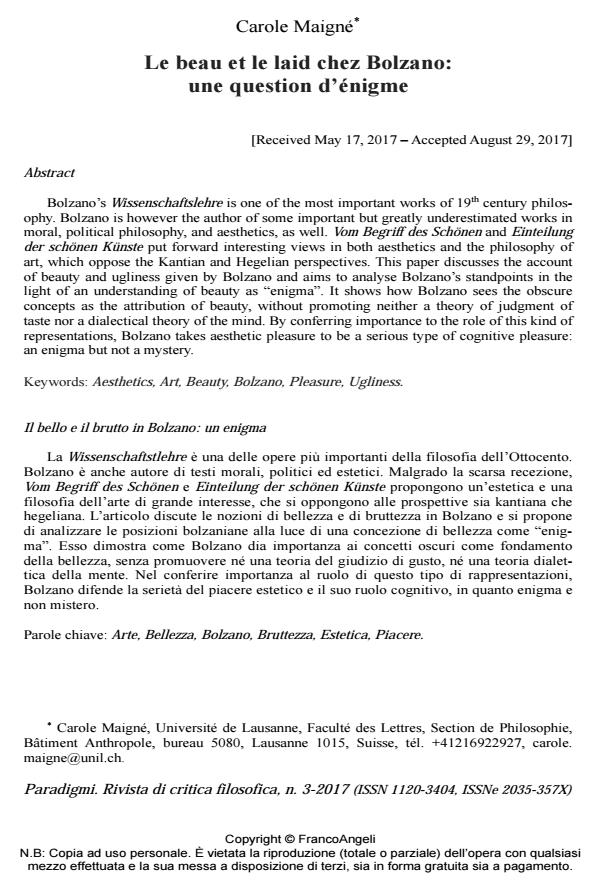Le beau et le laid chez Bolzano: une question d’énigme
Journal title PARADIGMI
Author/s Carole Maigné
Publishing Year 2017 Issue 2017/3
Language French Pages 15 P. 25-39 File size 187 KB
DOI 10.3280/PARA2017-003003
DOI is like a bar code for intellectual property: to have more infomation
click here
Below, you can see the article first page
If you want to buy this article in PDF format, you can do it, following the instructions to buy download credits

FrancoAngeli is member of Publishers International Linking Association, Inc (PILA), a not-for-profit association which run the CrossRef service enabling links to and from online scholarly content.
Bolzano’s Wissenschaftslehre is one of the most important works of 19th century philos-ophy. Bolzano is however the author of some important but greatly underestimated works in moral, political philosophy, and aesthetics, as well. Vom Begriff des Schönen and Einteilung der schönen Künste put forward interesting views in both aesthetics and the philosophy of art, which oppose the Kantian and Hegelian perspectives. This paper discusses the account of beauty and ugliness given by Bolzano and aims to analyse Bolzano’s standpoints in the light of an understanding of beauty as "enigma". It shows how Bolzano sees the obscure concepts as the attribution of beauty, without promoting neither a theory of judgment of taste nor a dialectical theory of the mind. By conferring importance to the role of this kind of representations, Bolzano takes aesthetic pleasure to be a serious type of cognitive pleasure: an enigma but not a mystery.
La Wissenschaftstlehre è una delle opere più importanti della filosofia dell’Ottocento. Bolzano è anche autore di testi morali, politici ed estetici. Malgrado la scarsa recezione, Vom Begriff des Schönen e Einteilung der schönen Künste propongono un’estetica e una filosofia dell’arte di grande interesse, che si oppongono alle prospettive sia kantiana che hegeliana. L’articolo discute le nozioni di bellezza e di bruttezza in Bolzano e si propone di analizzare le posizioni bolzaniane alla luce di una concezione di bellezza come "enigma". Esso dimostra come Bolzano dia importanza ai concetti oscuri come fondamento della bellezza, senza promuovere né una teoria del giudizio di gusto, né una teoria dialettica della mente. Nel conferire importanza al ruolo di questo tipo di rappresentazioni, Bolzano difende la serietà del piacere estetico e il suo ruolo cognitivo, in quanto enigma e non mistero.
Keywords: Aesthetics, Art, Beauty, Bolzano, Pleasure, Ugliness.
Carole Maigné, Le beau et le laid chez Bolzano: une question d’énigme in "PARADIGMI" 3/2017, pp 25-39, DOI: 10.3280/PARA2017-003003